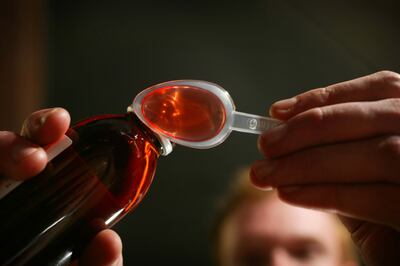New Delhi has launched an "urgent investigation" against an Indian pharmaceutical company after an alert from the World Health Organisation over cough medications that have been linked to the deaths of about 66 children in Gambia.
The global health body issued an alert over four cough and cold syrups made by Maiden Pharmaceuticals, a drug manufacturing company in northern Haryana state, on Wednesday, warning they could be linked to acute kidney injuries in the West African nation.
The four products are Promethazine Oral Solution, Kofexmalin Baby Cough Syrup, Makoff Baby Cough Syrup and Magrip N Cold Syrup.
An official from India’s Health Ministry on Thursday told The National that the WHO had informed the Drugs Controller General of India, the country's drug regulator, that it was providing technical assistance and advice to the African country because it suspects the children had used medicines contaminated with diethylene glycol or ethylene glycol.
“Those substances are toxic to humans and can be fatal and the toxic effect can include abdominal pain, vomiting, diarrhoea, inability to pass urine, headache, altered mental state and acute kidney injury, which may lead to death,” the WHO said.
Diethylene glycol and ethylene glycol are used in preparation of antifreeze, brake fluid, cigarettes, paints and some dyes, plastics, films and cosmetics.

An “urgent investigation” was taken up by the Central Drugs Standard Control Organisation (CDSCO), national regulatory body for cosmetics, pharmaceuticals and medical devices, a source said.
The ministry said Maiden Pharmaceuticals had manufactured and exported the products only to Gambia, although the WHO said the supply of the products through informal or unregulated markets to other countries in Africa “cannot be ruled out”.
It said the country that imports the products tests them on quality parameters — and only releases them for usage if it “satisfies itself as to the quality of the products”.
WHO asked to share report
The Health Ministry said the WHO has not provided the exact one-to-one causal relation of death or the details of labels and products to confirm the identity and source of the manufacturing of the products.
It asked the organisation to share its report establishing the causal relation to death with the medical products in question.
“Out of the 23 samples tested, four samples have been found to contain diethylene glycol and ethylene glycol as indicated,” the source said.
“WHO has been requested to share at the earliest with CDSCO the report on establishment of causal relation to death with the medical products in question, photographs of labels and products, etc, which is awaited.”
The Gambian health ministry launched an investigation in July when children died and an advice on syrup paracetamol was issued on September 9, a month after investigators reported the death of at least 28 children aged five months to four years from acute renal failure.
India’s pharmaceutical industry is the world's third largest in terms of volume and is worth $42 billion. Africa is one of the top five destinations for the country's pharmaceutical exports.

